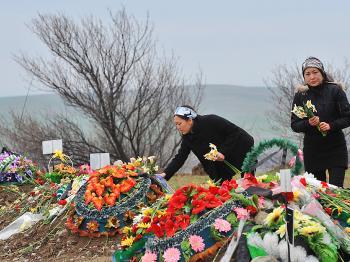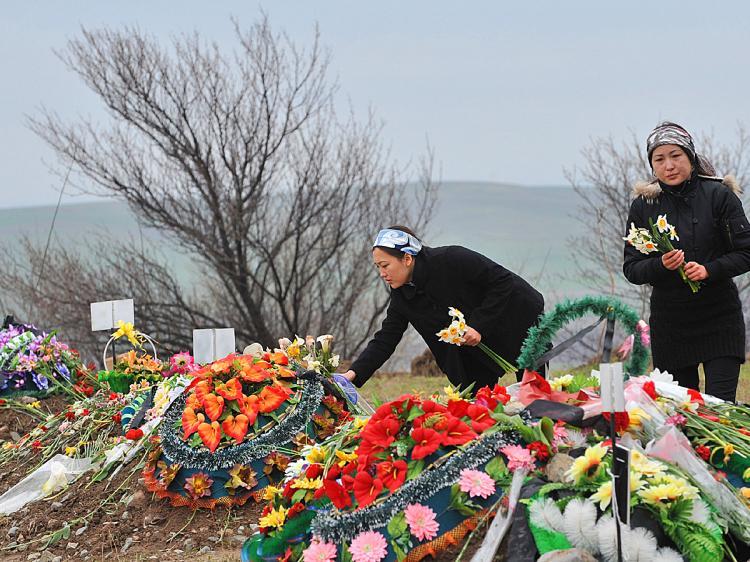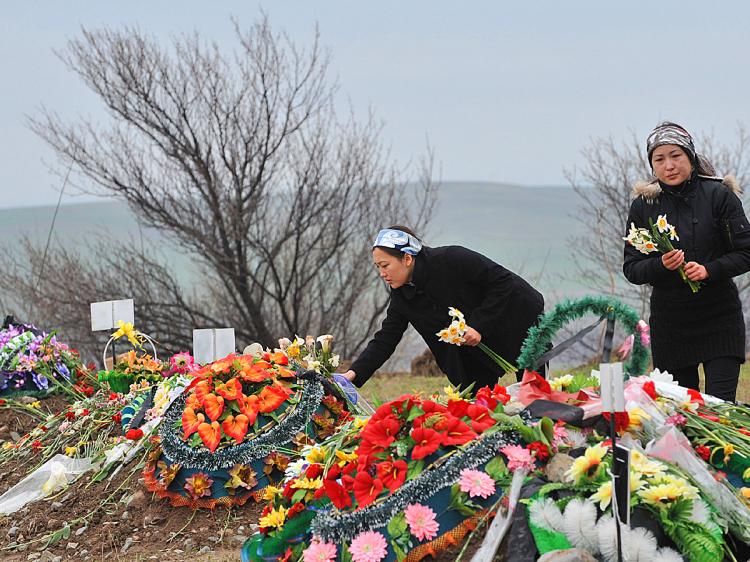Armed with sticks, shovels, and flaming liquids, more than 1,000 people staged an unruly demonstration on the outskirts of Bishkek, the capital of Kyrgyzstan Monday.
Two people were reported killed in clashes that sparked twice, once during the day and again in late evening. The demonstrators attempted to seize lands owned by ethnic Russians and Meskhetin-Turks, and destroyed their homes in the village of Maevka, located in the northern end of Bishkek.
The mobs demanded the interim government give them land for development, reported Kyrgyz national news agency AKIpress.
The current development is unsettling for the new government, which seized power earlier in the month by deposing Kyrgyz President Kurmanbek Bakiyev in a coup. The head of the self-declared authorities Roza Otunbayeva claimed that the armed forces had the situation under control and dozens of demonstrators were arrested.
Over the weekend, Bakiyev supporters captured a government office in the southern city of Jalalabad demanding his return, saying he is still the president.
Large protests also continued on Monday in some cities in the southern part of the country where Bakiyev has a large support base.
President Bakiyev had agreed on April 15 to step down and then fled the country to neighboring Kazakhstan. His safe departure was the result of joint efforts of the presidents of Kazakhstan, the United States, and Russia.
On Monday it was reported that he left Kazakhstan and his current whereabouts are unknown.
Kyrgyz’s current authorities still want to hold Bakiyev, his relatives, and allies accountable for the deaths of about 84 opposition protesters in clashes with the former government two weeks ago in Bishkek.
The new authorities said they would hold presidential elections in the fall and will reform the constitution.
The international community has not yet recognized the self-declared government in Kyrgyzstan, but some have expressed support by delivering humanitarian and financial aid, including the United States, Russia, and China among other countries.
Kyrgyzstan is a strongly clan-based Soviet republic divided into a more prosperous north and a predominantly agrarian south. Since the collapse of communism in 1991 until 2005, the country was ruled by northerner Ascar Akayev. He promised democratic development, but never managed to implement it.
During this period of fragile independence, some national parties based on past ideologies, including communism and socialism, existed in the country.
In 2005, Akayev was deposed by opposition leaders from the south, among them Kurmanbek Bakiyev. Bakiyev took the presidency after unscheduled elections, which the international community largely recognized.
Akayev was accused of nepotism and concentrating power in his own hands. During the coup in March 2005, called the Tulip Revolution, he fled to Russia.
After southerner Kurmanbek Bakiyev came to power, he promised the same democratic developments as Ascar Akayev had, but he also ran an authoritarian regime.
Under Bakiyev, the Unites States established an air base at Kyrgyzstan national airport in Manas, which was under threat of closure several times. The base serves as an important transit center for troops and warplanes going to Afghanistan.
The existence of the base has irritated Russia, which also has a military base in the country. Although Bakiyev was under pressure from Russia, he sought to exploit the American base as a source of income. The agreement was renegotiated and the rent increased several times.
Russia has always considered Central Asia to be in its sphere of influence and has competed with the United States and China for strategic energy resources and transit routes.
Roza Otunbayeva was born in the south Kyrgyz city of Osh in 1950. She studied philosophy and graduated from Moscow State University in 1972. Otunbayeva launched her career in the Kyrgyz Communist Party and served as the USSR’s emissary to UNESCO and ambassador to Malaysia in the 1980s.
She was twice appointed as Kyrgyzstan’s foreign minister under liberal post-Soviet President Askar Akayev, but broke from him in 2004, accusing him of corruption, nepotism, and undermining what democracy existed.
Otunbayeva was an ardent supporter of the Tulip Revolution and was originally Bakiyev’s ally. She attempted to run in the 2005 parliamentary elections, but her candidacy was barred by Akayev’s officials.
She eventually accused Bakiyev of also concentrating power into his own hands and blamed him for the country’s soaring utility prices and imposing media restrictions.
She then led the recent coup against her former ally to become the country’s new leader.
The White House had feared that the political shift might hinder extending its rental agreement on the air base, but Otunbayeva has assured Washington they will honor previously reached international agreements.
Two people were reported killed in clashes that sparked twice, once during the day and again in late evening. The demonstrators attempted to seize lands owned by ethnic Russians and Meskhetin-Turks, and destroyed their homes in the village of Maevka, located in the northern end of Bishkek.
The mobs demanded the interim government give them land for development, reported Kyrgyz national news agency AKIpress.
The current development is unsettling for the new government, which seized power earlier in the month by deposing Kyrgyz President Kurmanbek Bakiyev in a coup. The head of the self-declared authorities Roza Otunbayeva claimed that the armed forces had the situation under control and dozens of demonstrators were arrested.
Over the weekend, Bakiyev supporters captured a government office in the southern city of Jalalabad demanding his return, saying he is still the president.
Large protests also continued on Monday in some cities in the southern part of the country where Bakiyev has a large support base.
President Bakiyev had agreed on April 15 to step down and then fled the country to neighboring Kazakhstan. His safe departure was the result of joint efforts of the presidents of Kazakhstan, the United States, and Russia.
On Monday it was reported that he left Kazakhstan and his current whereabouts are unknown.
Kyrgyz’s current authorities still want to hold Bakiyev, his relatives, and allies accountable for the deaths of about 84 opposition protesters in clashes with the former government two weeks ago in Bishkek.
The new authorities said they would hold presidential elections in the fall and will reform the constitution.
The international community has not yet recognized the self-declared government in Kyrgyzstan, but some have expressed support by delivering humanitarian and financial aid, including the United States, Russia, and China among other countries.
Political Background
Kyrgyzstan is a strongly clan-based Soviet republic divided into a more prosperous north and a predominantly agrarian south. Since the collapse of communism in 1991 until 2005, the country was ruled by northerner Ascar Akayev. He promised democratic development, but never managed to implement it.
During this period of fragile independence, some national parties based on past ideologies, including communism and socialism, existed in the country.
In 2005, Akayev was deposed by opposition leaders from the south, among them Kurmanbek Bakiyev. Bakiyev took the presidency after unscheduled elections, which the international community largely recognized.
Akayev was accused of nepotism and concentrating power in his own hands. During the coup in March 2005, called the Tulip Revolution, he fled to Russia.
After southerner Kurmanbek Bakiyev came to power, he promised the same democratic developments as Ascar Akayev had, but he also ran an authoritarian regime.
Under Bakiyev, the Unites States established an air base at Kyrgyzstan national airport in Manas, which was under threat of closure several times. The base serves as an important transit center for troops and warplanes going to Afghanistan.
The existence of the base has irritated Russia, which also has a military base in the country. Although Bakiyev was under pressure from Russia, he sought to exploit the American base as a source of income. The agreement was renegotiated and the rent increased several times.
Russia has always considered Central Asia to be in its sphere of influence and has competed with the United States and China for strategic energy resources and transit routes.
Kyrgyzstan’s New Self-Declared Leader
Roza Otunbayeva was born in the south Kyrgyz city of Osh in 1950. She studied philosophy and graduated from Moscow State University in 1972. Otunbayeva launched her career in the Kyrgyz Communist Party and served as the USSR’s emissary to UNESCO and ambassador to Malaysia in the 1980s.
She was twice appointed as Kyrgyzstan’s foreign minister under liberal post-Soviet President Askar Akayev, but broke from him in 2004, accusing him of corruption, nepotism, and undermining what democracy existed.
Otunbayeva was an ardent supporter of the Tulip Revolution and was originally Bakiyev’s ally. She attempted to run in the 2005 parliamentary elections, but her candidacy was barred by Akayev’s officials.
She eventually accused Bakiyev of also concentrating power into his own hands and blamed him for the country’s soaring utility prices and imposing media restrictions.
She then led the recent coup against her former ally to become the country’s new leader.
The White House had feared that the political shift might hinder extending its rental agreement on the air base, but Otunbayeva has assured Washington they will honor previously reached international agreements.






